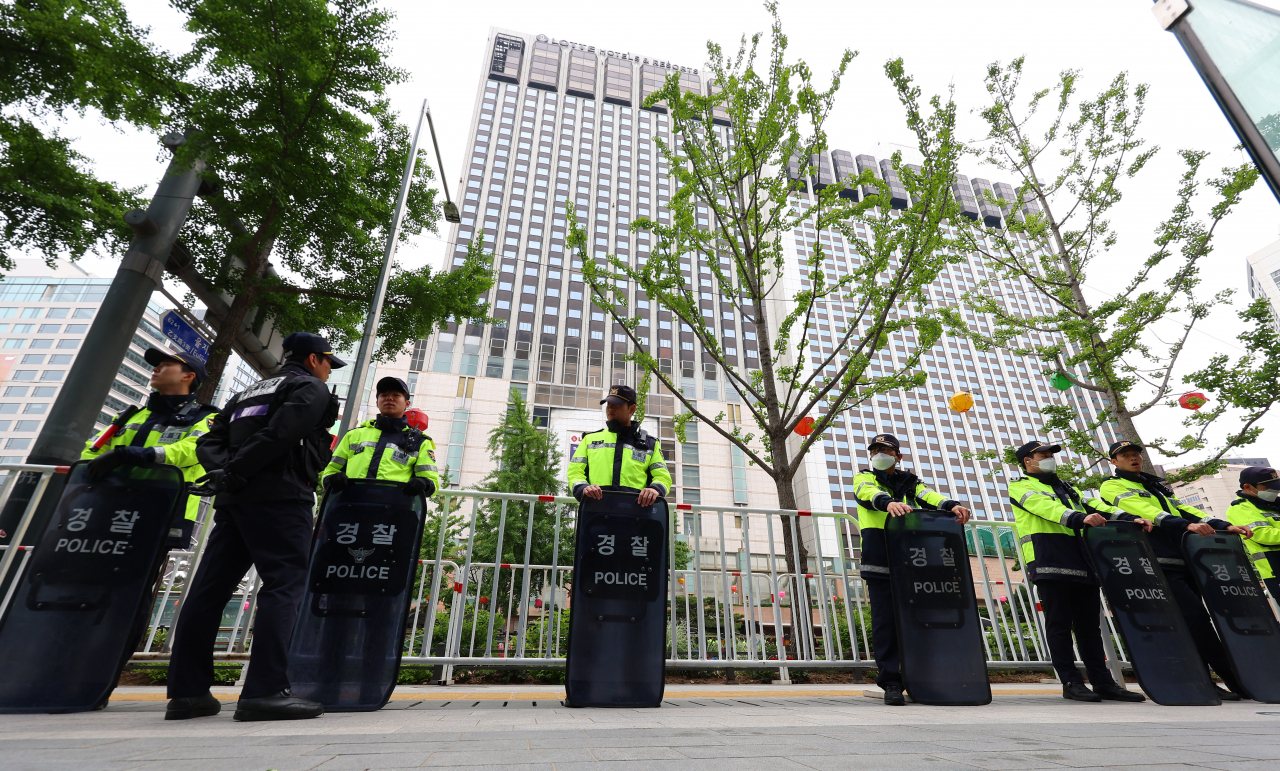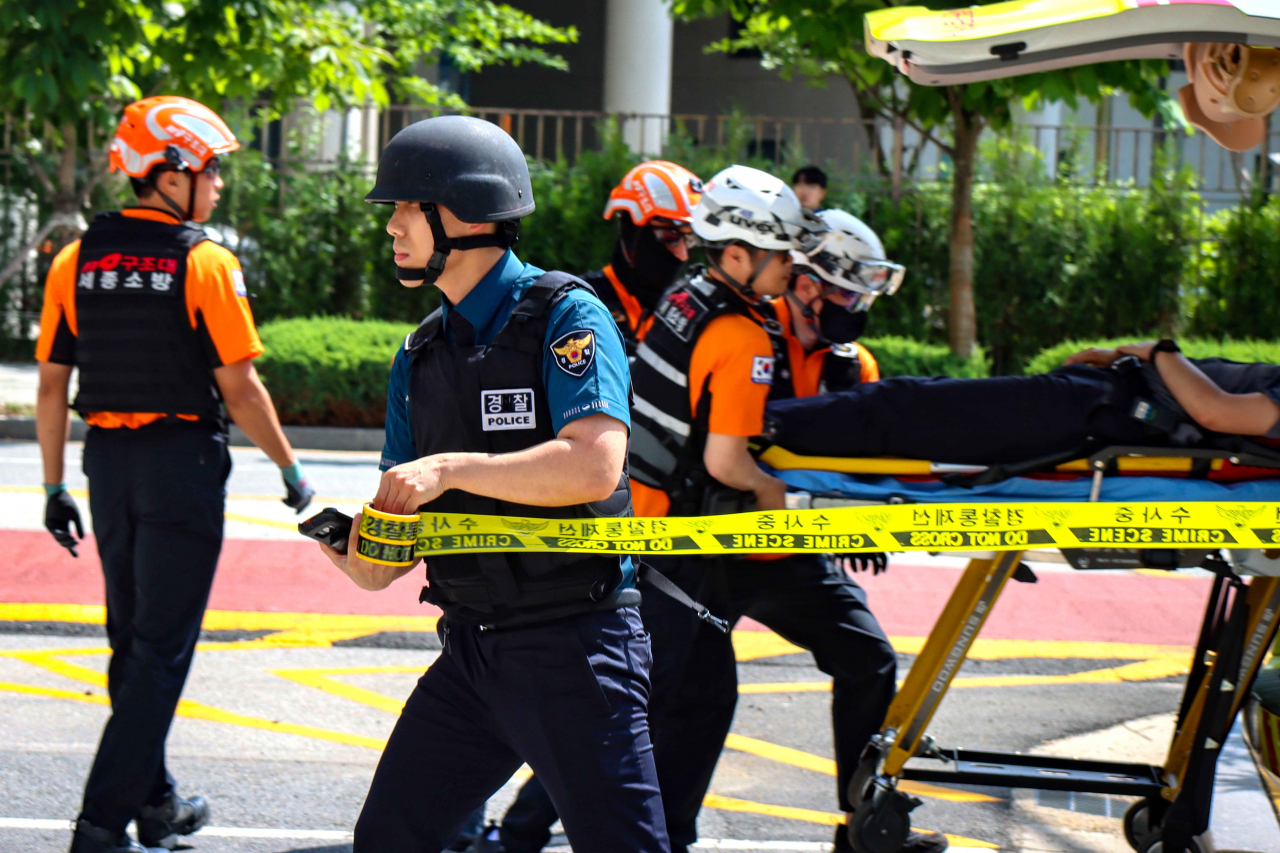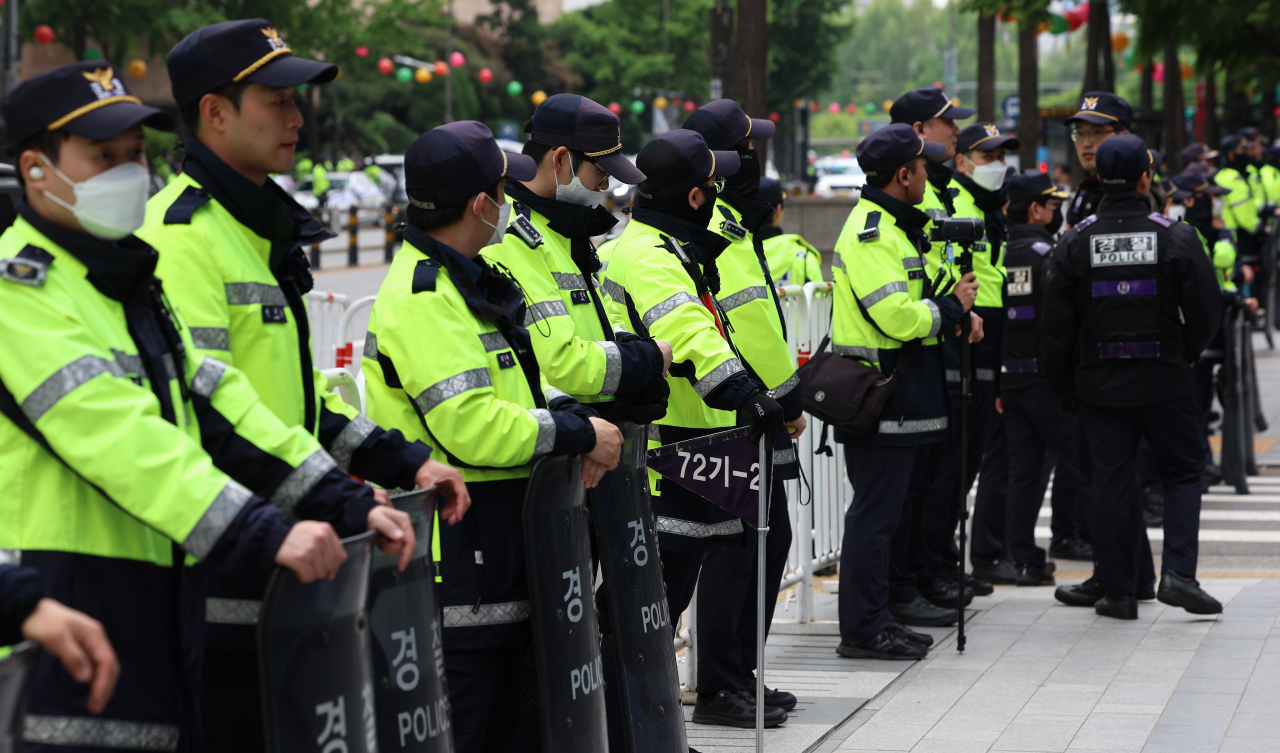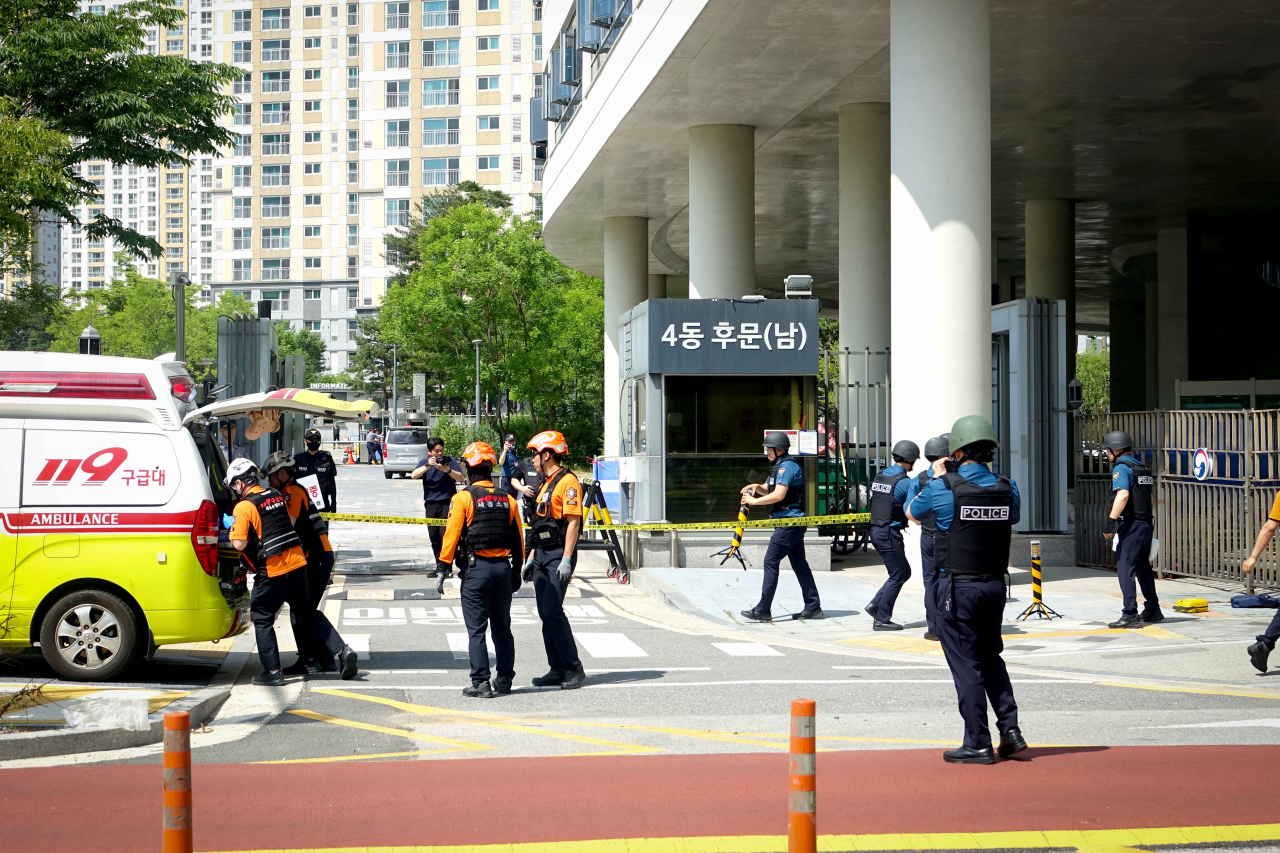Are Korean police officers underprotected?
Public scrutiny limits cops’ use of force against suspects, but violence against officers rarely receives severe punishment, police say
By Yoon Min-sikPublished : June 2, 2023 - 09:01
Earlier last month, a drunk woman in her 40s was arrested for assaulting and injuring a police officer who tried to apprehend her. The officer in question was reportedly unable to use physical force when arresting the suspect, out of fear that she might file sexual harassment charges against him.
Each year, thousands of police officers are attacked while conducting law enforcement. According to the National Police Agency, 5,825 of the 7,001 cases in 2021 involving the obstruction of performance of official duties were against police officers.
But in many cases, police officers' hands seem to be tied as both social perception and disapproving peers prevent them from using violent means to subdue suspects.
“People tend to think they can just walk all over young police officers. They would say, ‘You’re nothing but a grade 9 civil servant’. I’ve been slapped, kicked and even threatened with a knife,” said a 35-year-old police officer surnamed Lee based in Gyeonggi Province. The knife-wielding suspect had been threatening his wife when Lee showed up at the suspect's apartment. The suspect then turned the weapon towards the officer as he was approached.
But even when facing a violent man holding a knife, Lee refrained from using any type of force.

Under public eye, police reluctant to use guns
Lee, fortunately, was able to talk some sense into the man, but not all situations end so ideally. According to NPA data, a total of 2,301 police officers were injured by suspects between 2017 and 2021, and one officer was killed in 2018.
Even in such situations, police rarely use guns.
Between August of 2019 and July of 2020, there were only 14 cases in which a gun was fired at all, according to a recent study by the Korean National Police University’s Police Science Institute.
A closer look at the 14 cases of a gun being fired reveals that in only half of the cases, the weapon was used against a suspect.
In two cases, only warning shots were fired. In another, a gun was discharged by accident. In four cases, a gun was used to protect people from wild boars. There were a remaining total of seven cases in which police shot a suspect. Two were fatal and one led to a minor injury.
Though the US is heavily criticized for its extreme levels of gun violence, lack of strict gun laws and excessive police brutality, a total of 999 people were shot and killed by the police there in 2019, according to the Washington Post. Even taking into account the difference in population -- 328 million to 51.8 million -- and the fact that gun violence in America is 26 times that of other high-income nations, data indicates that South Korean police are substantially trigger-shy.
South Korean law states that a police officer can use his or her weapon when “under reasonable assessment of the situation, there are considerable causes” to do so. Police regulation states that a weapon can be used only if the situation has been rationally assessed, that if it absolutely calls for physical force to be used, and that there is no possible alternative.
“In our country, using weapons or ‘equipment’ (referring to less-lethal weapons such as Tasers) entails a lot of legal liability. Even in situations where it is likely to be concluded that the officer using force is justified, the lawsuits, deliberation committees, audits and most of all, public scrutiny from press coverage, cause extreme stress, from our point of view,” officer Lee explained.
The South Korean public has always had a complicated relationship with law enforcement officials, as the police and prosecution have a track record of being used by colonial rulers or dictators to suppress political opponents as well as innocent citizens.
Statistics Korea’s annual report on Korean society, released in March, showed that 49.6 percent of the public put their trust in police in 2022, while 51.5 percent believe in its fairness.
Hence, the public tends to keep a close eye on any use of force by the country’s police, which is in general a positive thing. In 2015, the direct firing of a water cannon fatally injured a 68-year-old farmer who was demonstrating against the former Park Geun-hye administration, and the public outcry against the police's excessive use of force led them to stop using water cannons.
But recent events may have sparked a wave of change in police officers’ hesitance toward using violence. In November of 2021, then-NPA chief Kim Chang-ryong said the police should “actively use force against actions that threaten people's lives and safety.” After his remarks, police use of guns and Taser guns reportedly doubled in December from the previous month.
The police are planning to adopt what is called the non-lethal handgun STRV-9, as an alternative intended to allow officers to subdue suspects with less risk of serious injury.

Culture of blaming officers themselves for getting attacked
Article 136 of South Korea’s Criminal Act states that anyone who uses violence or intimidation against a public official engaged in the execution of his or her duty shall be punished by up to five years in prison or 10 million won ($7,571) in fines. But in practice, the cases rarely end in an actual prison term.
Last week, a Seoul court sentenced a 26-year-old man who attacked police officers who “wouldn’t listen to him” while testifying about an internet scam case to a suspended prison term. The court explained that it is because he gave a full confession and that the attack was not severe.
Despite the legal clause, evidence suggests that not many receive jail time for attacking police. According to the 2022 annual report by the Supreme Court, there were 6,743 cases of the obstruction of performance of official duties in 2021, and those convicted were given suspended prison sentences in 3,179 of the cases, and were fined in 2,137 cases.
In only 17.9 percent of the cases were the perpetrators actually jailed.
Testimonies indicate that some within the police force tend to blame the officers themselves for falling victim to abuse perpetrated by a suspect. Researchers of the Police Science Institute conducted interviews of 11 police officers to find out what type of impact violence against a police officer may leave on them.
A senior patrol officer in his 30s cited in the report said that as an organization, police tend to perceive an officer who has been repeatedly assaulted as “having problems.” “Some say (the assaulted) officer is hot-headed and deliberately irritated (the suspect), leading to the attack. Such comments make me lose faith in the organization,” he was quoted as saying in “A Study on the Process and Influence of Violence Against Police Officers” published in 2021.
Another officer said that after he was attacked by a suspect with a hatchet, his superiors said -- in the presence of the attacker -- that “it is nothing. The hatchet is not even sharp enough to cut grass.”

More awareness, respect for police needed
The study’s lead author, Lee Jae-yeong, a professor of police administration at Sehan University, said that female officers have more trouble reporting attacks against them, out of concern that it might lead to social perceptions that female officers are incompetent. An officer in her 20s said that after a suspect punched her in the face, her colleagues said in passing that they were “concerned about what people might say since a female officer was hit.”
“This made me feel as if I’d done something wrong,” she said.
Lee stressed the need for an awareness of the physical and mental harm assault may leave on police officers, and the need for a system that allows them to get counseling and treatment from experts. “We need to improve the culture of taking attacks against police officers lightly, or regarding them as a result of their incompetence. It is a grave matter since this type of culture can lead to the police becoming passive, discouraged and even leaving the force,” he said.
Officer Lee said that the police officers themselves are well aware of the dangers of unchecked violence being committed by authorities. “Human rights are important, of course. When I’m not on duty, I’m a citizen too, and I wouldn't want someone to use excessive force against me."
“But at the same time, people need to respect the judgment of the officer on the scene. When a police officer uses violence, most of them do so with prudence in the most urgent situations. I think (society) needs to respect us a little more,” he said.




















![[Today’s K-pop] Treasure to publish magazine for debut anniversary](http://res.heraldm.com/phpwas/restmb_idxmake.php?idx=642&simg=/content/image/2024/07/26/20240726050551_0.jpg&u=)